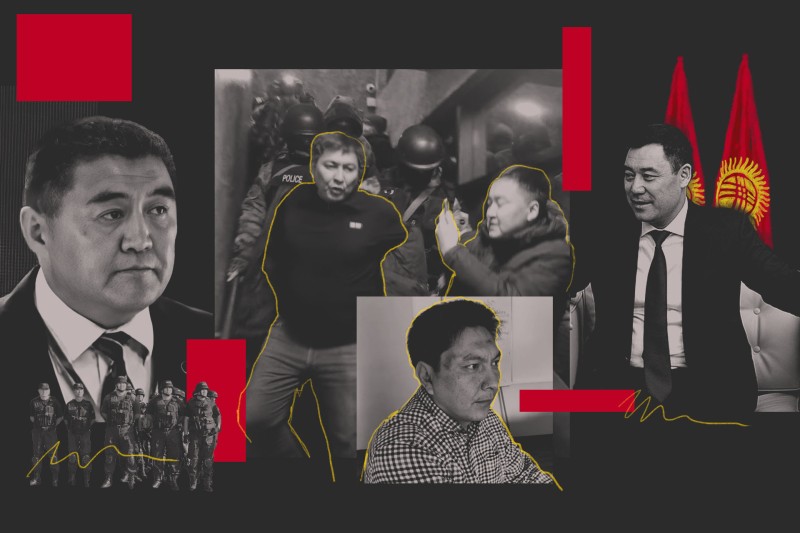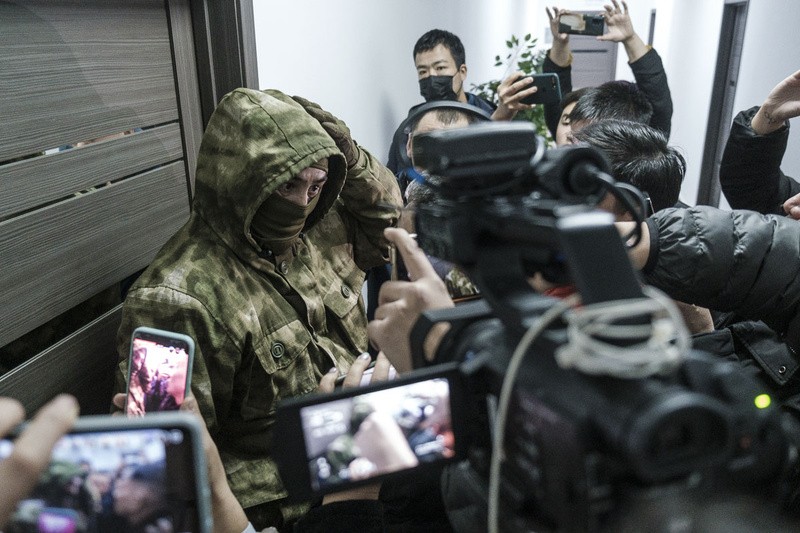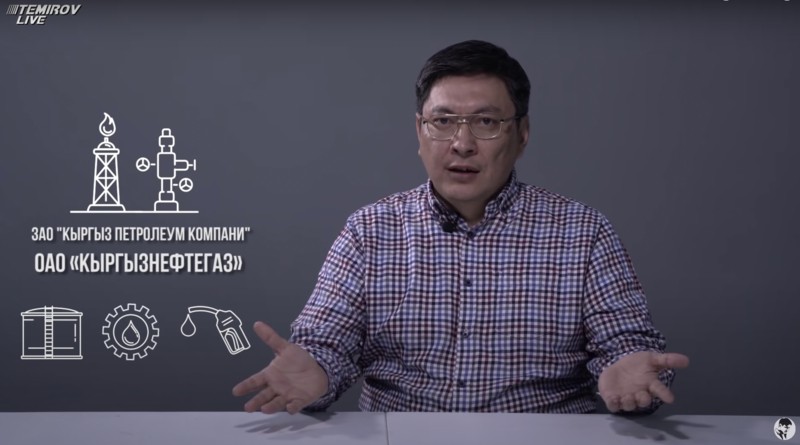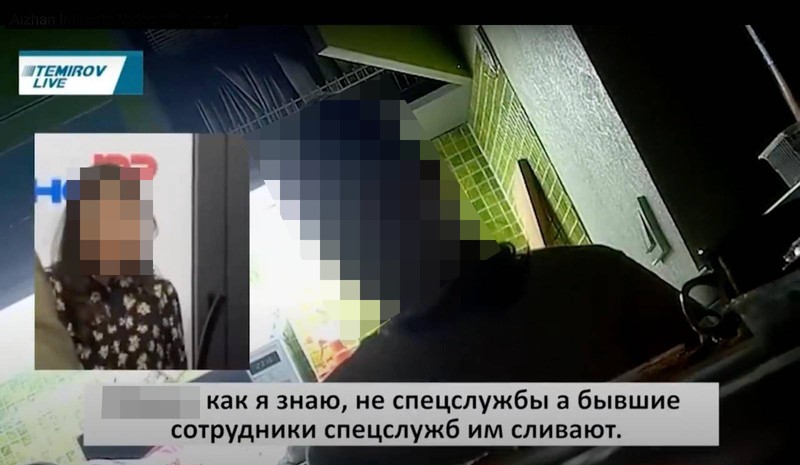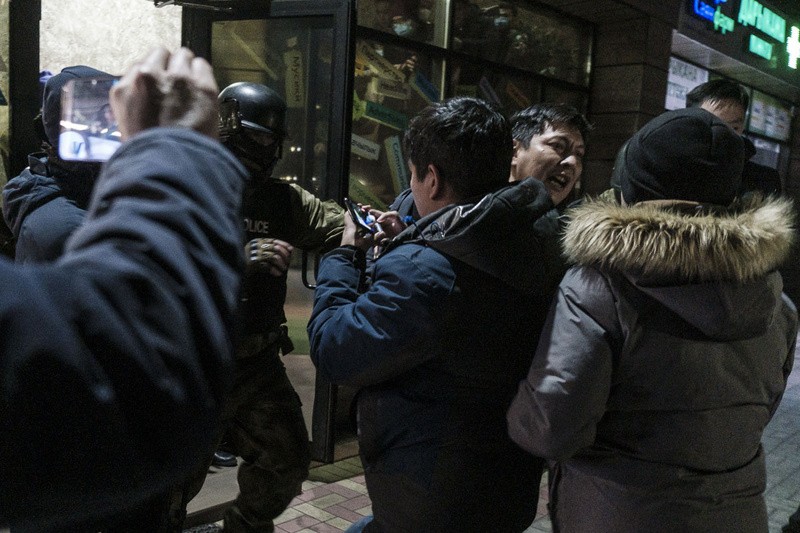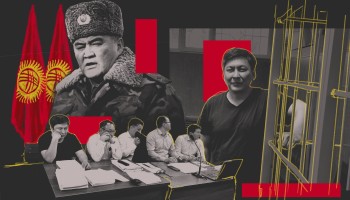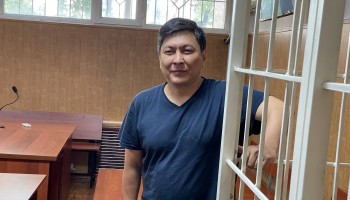Journalist Aktilek Kaparov had just stepped out of his building for a coffee when he noticed something strange.
“There were some suspicious people in masks and civilian clothes walking around, and two police officers. And literally five minutes later, five or six guys came out in masks and tactical gear,” he said, pointing to an unmarked white van.
“Another guy came out with a dog. And they all came here.”
This was the beginning of a dramatic Saturday night raid by anti-drug police in Bishkek, the capital of Kyrgyzstan. Their target on January 22 was the office of Temirov LIVE, a new media outlet that focuses on exposing high-level corruption — and had just published its latest investigation.
The police burst into the office, forcing the outlet’s employees onto the floor. Two officers sat on Bolot Temirov, the chief editor. Then they lifted him up and made him empty his pockets. Among the items he found, to his horror, was a small cellophane packet. Claiming that it contained marijuana, the officers seized the outlet’s computers and carted the journalist away.
“They planted it!” Temirov shouted as he was dragged out of his office. His colleagues also say they’re convinced the packet had been planted, and Temirov later tested negative for drugs.
As this investigation by OCCRP, Kloop, and RFE/RL reveals, the raid did not come out of nowhere. It was the culmination of months of surveillance and harassment directed at Temirov and his team.
In the fall, Temirov said, he and his colleagues noticed suspicious vehicles parked outside their office. In December, a hidden camera and microphone was found in the apartment he was renting.
Perhaps most disturbingly, the authorities appear to have concocted a scheme to entrap one of Temirov’s employees.
The young woman had been romantically pursued by a man who approached her at the gym and then invited her on a weekend lakeside getaway. As it turns out, according to a law enforcement source, he was an agent of the GKNB, Kyrgyzstan’s secret service. During the course of their short relationship, her laptop was breached, a sexual encounter was secretly recorded, and a group of men who presented themselves as GKNB agents pressed her for information about Temirov’s upcoming investigations, threatening to ruin her life and her parents’ reputation if she refused.
One of those investigations — published just days before the raid — alleged that family members of the powerful head of the GKNB, Kamchybek Tashiev, had benefited from corrupt deals involving a state oil company.
The reaction was swift, and it did not end with Temirov’s arrest. Over the following week, several videos were posted online by anonymous Facebook pages that accused him of being a criminal and a traitor to Kyrgyzstan. The videos used donor reports, contracts, and other documents that appear to have been obtained from the seized computers to portray Temirov as an agent of foreign interests.
One of the videos also made good on the agents’ earlier threats, exposing the intimate footage of Temirov’s young employee and using it to concoct a wild allegation that his organization had pressured her to raise funds from foreign donors by submitting to them sexually.
“This means they’re afraid of our investigations,” Temirov says about the authorities’ methods. “Before they simply didn’t respond, they tried to explain themselves. But the more we kept doing investigations, the more difficult that became.”
“This is how they’ve chosen to get rid of something that’s in their way.”
Given Temirov’s stature as one of Kyrgyzstan’s leading independent journalists, an apparent systematic effort by the authorities to destroy him and his organization is a devastating blow to press freedom in the country.
Human rights groups warn that the climate for free expression has deteriorated since President Sadyr Japarov came to power in October 2020. (Tashiev, the GKNB head, has described the president as his “dear friend,” adding that “only Allah can separate us.”)
“Everything that's happening reflects a kind of feeling of impunity and permissiveness among the ruling authorities,” said Azim Azimov, a Kyrgyzstani political commentator. “[They] have assaulted freedom of speech in our country, trying to restrict the work of independent journalists, and especially investigative journalists.”
Temirov has been released on instructions not to leave the country, but drug charges against him remain open. The Interior Ministry and the GKNB did not provide responses to requests for comment. Last week, the GKNB released a statement denying any connection to the raid against Temirov or the compromising published video.
The Rise of Kamchybek Tashiev
When protesters stormed the Kyrgyz White House in 2020 and overthrew the government, they were following a well-known script in the country’s politics.
“Bandit Methods”
Temirov is no stranger to pressure, and even violence.
In late 2019, the outlet he was leading at the time, Factcheck.kg, published an investigation that exposed the wealth of a powerful former customs official. Temirov was then offered money to stop subsequent publications, slandered by trolls online, and had his web site taken down by a DDOS attack.
In January 2020, he was savagely beaten by three young men he believes had been sent by the former customs boss.
But far from stopping him, the incident only convinced him he had to press on.
“It was when they attacked me,” he said. “The turning point, when I fully decided that I had embarked on this path, and would do investigations.”
It was then that he set up his new outlet, Temirov LIVE. By that summer it had published the first of its investigations, which are presented in clever, well-explained online videos reminiscent of the ones that helped make Russian opposition leader Alexei Navalny a household name.
And he didn’t shy away from sensitive topics. In the spring of 2021, Temirov published a story showing that many “protesters” who took to the streets in support of the embattled head of the Interior Ministry were actually ministry employees. This was followed by attempts to break into his social media accounts.
Then things went quiet — for a while.
Starting this October, Temirov said, he and his employees began to notice suspicious cars parked outside their office.
But an even more disturbing phase was about to begin.
In December, while Temirov was out of the country, his brother-in-law came across some unfamiliar devices under a dresser in his rented apartment: a digital video recorder, a wi-fi router, a custom-made power supply unit, a microphone, and several wires.
Following them behind the wallpaper, Temirov’s brother-in-law found a video camera filming the living room through a tiny hole.
The files saved on the device, which were viewed by reporters, indicate that it had been recording for several weeks. But the system was also connected to a cloud server, which could have allowed it to upload footage in real time.
In fact, several segments of audio Temirov says were recorded in his apartment were used in one of the propaganda videos that later appeared online.
Accompanied by dramatic music and the menacing, digitally modified voice of an unnamed narrator, the video accuses Temirov of accepting money from both Western and Russian agents who are bent on influencing Kyrgyzstan. It features a clip of Temirov discussing the purchase of camera equipment with an OCCRP employee, and another of him in an argument with his wife.
The video also included audio clips that, Temirov said, had been recorded in his office.
“Those in power use bandit methods, they violate all imaginable moral and state laws,” he said. “These people are absolutely unfamiliar with the concept of legality. And I’d say even humanity.”
The ordeal experienced by one of Temirov’s employees shows how far his enemies in government were prepared to go.
“What About Your Mom and Dad?”
Aigul had been working for Temirov LIVE as a project manager, not a journalist. Her daily routine usually involved dealing with international grants and communicating with donors.
But in the course of just a few weeks earlier this winter, a chance encounter turned her life into a nightmare.
Aigul — a pseudonym OCCRP, Kloop, and RFE/RL agreed to use to protect her privacy — told journalists her story in a lengthy interview whose key points were corroborated, where possible, through chat transcripts, screenshots, and computer logs.
It began in December, when she was approached in the gym by a young man who helped her put weights on her exercise machine and afterwards gave her a ride to a meeting. They began exchanging messages, and before long he had invited her on a weekend getaway to Issyk-Kul, a scenic lake in the east of the country.
“He rented the apartment, organized everything himself,” Aigul said.
She had no idea until much later that their sexual encounter in the apartment that night was recorded from multiple angles.
But it wasn’t long before she felt that something was wrong. The next morning, while he was making breakfast, the young man asked her for the password to her laptop so he could play a video. She typed it in herself, but later he asked again.
“And he brings his phone up, when I was putting it in,” she said. “I thought he was recording me, and I moved further away.”
The couple then spent the afternoon at a hot spring. While they were out, someone came into the apartment and broke into her laptop, according to an analysis by Temirov LIVE’s security consultant that was also reviewed by OCCRP.
“They put in the password about 30 times,” Aigul said. “And in the end, they got in.”
Looking at her browser history later, Aigul saw that the intruders had done an online search about disabling Windows Defender, an antivirus program that is part of the operating system, and installed a spyware program. But she only learned of the incident on the following morning, when she got a call from the security consultant.
On overhearing part of their conversation, the young man became agitated, asking her who she worked for, claiming that 10,000 som ($118) was missing from his jacket, and rushing her back to Bishkek.
“After this, of course, all my suspicions were on him,” she said. “Because that other morning, when he brought [his phone] up like this, also seemed strange.”
She thought he might be a government agent, but wasn’t sure. “I kept speaking to him,” Aigul said, “because I had to find out, is he with them or not?”
Several weeks later, the young man invited Aigul to a rented country house. But within a few hours, the evening turned terrifying. After dinner, she emerged from the bathroom to find him being questioned by three masked men who identified themselves as GKNB agents.
But soon, it became clear they had come for her.
They began by pulling out a photograph of her parents.
“He’s a good, respected man, he works for the government,” Aigul recalled one of them saying about her father. “You’re the daughter of such exemplary parents. Do you know where the money [for your salary] comes from?”
They also showed her a photo they had taken of Temirov, describing him as a foreign agent who was trying to “help foreign security services destabilize the situation in the country.”
“They work under the cover of donors, and these donors are funded by foreign special services, and it’s good for them for our country to have revolutions,” she said they told her.
Again and again they demanded that she sign a cooperation agreement with their agency and to inform on Temirov. But when Aigul refused, they turned to a new form of pressure, showing her the secretly recorded videos of her night with the young man and threatening to publish them.
“Alright, you’re young and brave, you’ll get through it,” she said the agent told her. “But what about your mom and dad? Their hearts won’t survive it. They’ve worked for so long, earned such respect, and in one moment you’ll destroy it all.”
When she said nothing, the lead agent turned up the pressure. “My guys are by your parents’ house” she said he told her. “I’m going to call my guys. They’re going to go to your parents and show them the photos. That’ll be a nice New Year’s present.”
Now many hours into the session, Aigul broke down. “I had to sign,” she said, “because I understood that they would never leave if I didn’t.” The young man then took her home.
Reporters were unable to find out anything about him using the name he had given her, and he did not appear in official taxpayer and voter databases. But when shown a photo of him, a source in Kyrgyz law enforcement immediately recognized him as a GKNB agent using a different name.
The fact that Aigul was pressured by people identifying themselves as GKNB agents can also be corroborated. A few days later, she received several text messages from someone who used her parents’ address as an account name. Their first exchange is reproduced here in English:
They continued to demand more:
When Aigul said she wasn’t sure, her contacts weren’t happy.
Aigul didn’t answer. By the end of that day, Temirov LIVE’s investigation about the family of GKNB head Tashiev had been published on YouTube. After that, Aigul said, the agents never contacted her again. “They lost interest in me, because I didn’t warn them,” she said.
However, the propaganda video featuring her intimate footage was published online several days later. She never saw the young man again.
“You Planted It!”
Two days after Temirov and his team published their investigation, the drug police headed for their office.
The formal reason for the raid was a complaint by a woman named Aiperi Adyl kyzy. Just a few hours earlier, she told police that a man named “Bolot” had forced her to use drugs at several locations. She named two addresses, including the office of Temirov LIVE.
(Reporters found several of her social media accounts and sent direct messages with questions about her role in the case. She did not respond in time for publication.)
Normally, legal specialists say, any raid would have to be authorized by a judge. But in exceptional situations, an investigator can also authorize a search if there is concern that physical evidence might be lost or tainted.
The senior investigator of the Bishkek City Department of Internal Affairs appears to have used this loophole, citing “real concerns that material evidence … may be lost, damaged, or used for criminal purposes.”
Based on that warrant, special forces of the Service for Combating Illicit Drug Trafficking were sent to Temirov LIVE’s headquarters.
OCCRP, Kloop, and RFE/RL interviewed Temirov and everyone else who was present, gaining a clearer idea of what took place during the raid.

After making all the men lie on the floor and tying their hands, officers picked them up one by one and told them to empty their pockets. Temirov was last. When he pulled out the small cellophane bag, his wife Makhabat recalls, his face registered shock.
“He burst into tears, because he had just been defamed out of the blue. He went into hysteria, started panicking. We were all in shock,” she said. “Then I said, ‘calm down, we all see that they planted it, don’t be hysterical.’”
“‘You planted it, I saw,’” she recalled shouting. “I started yelling, Bolot started yelling, everyone started yelling.”
According to the Temirov LIVE employees and their lawyers, the officers made numerous procedural errors and even violated the law during the operation.
During the search, officers seized multiple laptops and computers, flash cards, a cell phone, and a video recorder that was connected to the video surveillance system in the office.
But according to the outlet’s lawyers, the seizure of the equipment violated search procedures because it had no connection to the accusations against Temirov.
"When conducting a search and seizure, the investigator should restrict themselves to seizing items and documents that may be relevant to the case," said lawyer Bekbolot Kasabolotov.
The next day — commenting on what, by all outward appearances, was a minor drug arrest — GKNB head Kamchybek Tashiev stated that he "does not have the moral right, under the guise of defending freedom of speech, to turn a blind eye to some crimes."
"If there is a crime, all the equipment must be seized. Perhaps these computers have information about drugs, prices, and sellers. I hope there's nothing in their computers that can harm the state," he said.
Temirov LIVE employees believe that the equipment was seized so that the police could find out what the media outlet was investigating. They also suspect the police took the video recorder to prevent their actions during the raid from being scrutinized.
Procedural Violations
The raid of Temirov LIVE’s office also featured multiple other procedural violations, the outlet’s lawyers said.
Since his arrest, Temirov has been released from prison, pending an investigation. He faces up to five years in prison if convicted on charges of drug possession. Several employees have also been called in for questioning.
But many Kyrgyz citizens have voiced their outrage at his treatment, which local experts view as unprecedented.
“Pressure against journalists and media outlets has taken place in practically all regimes,” said Azimov, the Kyrgyz political commentator. “But they tried to lend this process at least some illusion of legitimacy. They found some formal grounds, went to court,” he said.
“But in this case, a journalist with a good reputation unceremoniously has drugs planted on him, in view of witnesses,” he went on. “Then they confiscated not only their equipment, but the surveillance footage, so that the traces of these crimes would not be saved. Of course this cannot cause anything other than outrage and anger.”
Temirov himself remains defiant.
“This means we’ve become stronger,” he said. “Journalism is developing in Kyrgyzstan. Such things terrorize those in power. In the first place, all of this happens because the authorities have no principles. But the second reason is that investigative journalism has become very strong.”
